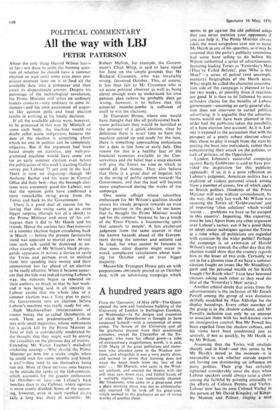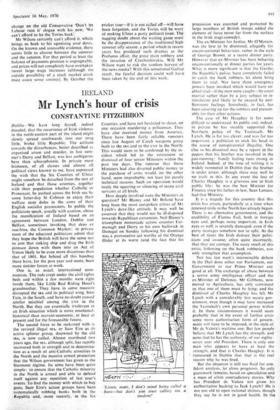POLITICAL COMMENTARY
All the way with LBJ
PETER PATERSON
About the only thing Harold Wilson has—. so far—not done to settle the burning ques- tion of whether he should have a summer election or ,wait until some even more pro pitious moment later on is to feed all the available data into a computer and then await its dispassionate answer. Despite his patronage of the technological revolution, the Prime Minister still relies on ordinary human contacts—very ordinary in some in- stances—and his own assessment of augur- ies like opinion polls and local election results in arriving at his lonely decision.
If all the available advice were, however, to be processed in this way by Mintech or some such body, the machine would no doubt suffer acute indigestion, because the date of the election is something about which no one in politics can be completely objective. But if the argument had been based simply on statistics, any well-pro- grammed machine would have come- out for an early summer election even before the publication of this week's startling Gallup survey put Labour 74- per cent in the lead. There is now no disguising—though Mr Anthony Barber and his team at Central Office did their best—that the borough elec- tions were extremely good for Labour, nor that the opinion polls have confirmed a most remarkable swing away from the Tories and back to the Government.
There is a good deal of reason for be- lieving that this swing came as an even bigger surprise (though less of a shock) to the Prime Minister and most of his col- leagues than it did to Mr Heath and his friends. Hence the curious fact that rumours of a summer election began circulating back in March — before the present favourable trend was apparent to mortal eyes. At that time such talk could be dismissed as an- other example of Mr Wilson's black propa- ganda apparatus in action, a device to rattle the Tories and perhaps even to mislead them into spending their money and their ammunition too far ahead of an election to be really effective. When it became appar- ent that the tide was indeed turning Labour's way, the rumours began to rebound on their authors, so much so that by last week- end it was being said in all sincerity in Labour circles that the whole idea of a summer election was a Tory plot to panic the Government into an election before Labour's machine was really ready for one.
Such Machiavellian interpretations of events betray the so-called Octoberists at work. These are predominantly Labour MPS with small majorities, whose enthusiasm for a quick kill by the Prime Minister in June or July is considerably moderated by the thought that they might well be among the casualties on the glorious day of victory. Extending Mr Victor Feather's maladroit cricketing analogy—Why should the Prime Minister go now for a sticky single, when he could wait for some months anct knock a six?'—they tend to see themselves being run out. Most of these nervous ones happen to be outside the ranks of the Cntivernment, which accounts for the greater enthusiasm for October—or later—on Labour's back benches than in the Cabinet, where opinion is more evenly divided. Some of the reason- ing, however, even in such rarefied circles falls a long way short of scientific: Mr
Robert Mellish, for example, the Govern- ment's Chief Whip, is said to have opted for June on the simple grounds that Mr Richard Crossman, who was invariably wrong, favoured October. This, of course, is less than fair to Mr Crossman who is an acute political observer as well as being clever enough even to understand his own pension plan (where he probably does go wrong, however, is to believe that this actuarial mumbo-jumbo is sufficient of itself to win the election).
In Transport House, where one would have thought that like all professional back- room politicians they would be horrified at the prospect of a quick election, since by definition there is never time to have the machine geared up and ready for the race, there is something approaching enthusiasm for a date in late June or early July. One reason for this is a healthy fear of the financial resources available to the Con- servatives and the belief that a snap election will give the Tories no time in which to spend all that money. They also believe that there is a great deal of impetus left in the swing of public opinion towards the Government, and that the lead will become more emphasised during the weeks of the campaign.
One senior official whose schoolboy enthusiasm for Mr Wilson's qualities should ensure his steady progress towards an even higher position in the party, let me know that he thought the Prime Minister would opt for the summer 'because he has a touch of the Errol Flynns, a buccaneering spirit that appeals to people'. A less exuberant judgment from the same quarter is that the known hazards ahead of the Govern- ment during the summer and autumn can be listed, but what cannot be foreseen is that some other disaster might occur to wreck complacent calculations about wait- ing for October and an even bigger majority.
Meanwhile Transport House gets on with preparations obviously geared to an October date, with an advertising campaign which seems to go against the old political adage that you never mention your opponents if you can help it. The Prime Minister always takes the most scrupulous care not to name Mr Heath in any of his speeches, so it may be assumed that the party's publicity committee had some hard selling to do before Mr Wilson authorised a series of advertisements featuring leading Tories as 'Yesterday's Men (They've Failed Before)', plus 'Who is this Man?'—a series of potted (and uncompli- mentary) biographies of the Heath team. What might be called the character assassina- tion side of the campaign is planned to last for two weeks, or possibly three if reactions are good. It is then to be followed by more orthodox claims for the benefits of Labour government—assuming an early general elec- tion does not intervene to curtail political advertising. It is arguable that the advertise- ments would not have been planned in this order had the publicists taken the possibility of a June election into account. As it is, Lab- our is exposed to the accusation that with the prospect of a pretty robust election ahead they chose to play it rough from the start by putting the boot into individuals, rather than concentrating their attack on the policies, or lack of policies, of the Opposition.
Lyndon Johnson's successful campaign against Barry Goldwater is said to have pro- vided the inspiration for this publicity approach: if so, it is a poor reflection on Labour's judgment. American politics has a tradition of violent personal attack arising from a number of causes, few of which apply to British politics. (Students of the Prime Minister will note without astonishment, by the way, that only last week Mr Wilson was accusing the Tories of `Goldwaterism' and of importing 'alien solutions' which would `create ... problems we have so far escaped in this country'. Importing, like exporting, must be fun.) Apart from any other argument over Labour's tactics, can it be a good thing to adopt smear techniques against the Tories at a time when all politicians are regarded with cynicism by the wider public? Perhaps the campaign is an extension of Harold Wilson's weary remark the other day that the election would show that the country regards him as the lesser of two evils. Certainly we are in for a gloomy time if we have a summer election fought on issues like Mr Maudling's girth and the personal wealth of Sir Keith Joseph ('Sir Keith who?' I can hear bemused electors asking each other as they read the first of the 'Yesterday's Men' series.)
Another ethical doubt that arises from the advertisements is the inclusion of Mr Enoch Powell among the group of wax dummies skilfully modelled by Alan Aldridge for the display hoardings. Every other member of the group is in the shadow cabinet, and Mr Powell's inclusion can only be an attempt to associate them with his well-known views on immigration control. But Mr Powell has been expelled from the shadow cabinet, and his views have been condemned just as severely, if not as quickly, by Mr Heath as by Mr Wilson.
Assuming that the Tories will retaliate sharply and in kind—and this seems to be Mr Heath's mood at the moment—it is reasonable to ask whether outside experts are having too dominating an influence on party politics. Their grip has certainly tightened considerably since the days when Labour speakers could always raise a cheer among the faithful by pointing amusedly to the efforts of Colman Prentis and Varley. Labour now has its own Colonel Varley in the person of Mr David Kingsley, of Kings- ley Manton and Palmer, ringing a neat change on the old Conservative 'Don't let Labour ruin it' slogan with his new, We can't afford to let the Tories back'.
Mr Wilson certainly can't afford it, which brings us back to his agonising over dates. On the known and assessable evidence, there seems little to choose between the summer and the autumn. For that period at least the balance of payments position is impregnable, and prices will not completely have overtaken recent large wage increases (although the outside possibility of a stock market crash must cause some anxiety). By October the cricket tour—if it is not called off—will have been forgotten, and the Tories will be wary of making Ulster a party political issue. The nagging doubt about the waiting game must be the disappearance of the traditional high summer silly season, a period which in recent years has produced such dramas as the Profumo affair, the great train robbery and the invasion of Czechoslovakia. Will Mr Wilson want to risk the random harvest of the news media? With this sensational Gallup result, the fateful decision could well have been taken by the end of this week.



































 Previous page
Previous page